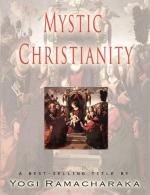Jesus began to ponder over these things. He had absolutely no material ambitions for Himself and all His impulses and inclinations were for the life of an occult ascetic. But the idea of a redeemed and regenerated Israel was one calculated to fire the blood of any Jew, even though the element of personal ambition might be lacking in him.
He had always realized that in some way He was different from other men, and that some great work lay ahead of Him, but He had never understood His own nature, nor the work He was to do. And it is not to be wondered that the talk among the Essenes caused Him to ponder carefully over the idea expressed by them. And then the wonderful event of the dove, and the Voice, upon the occasion of His baptism, seemed almost to verify the idea of the Essenes. Was He indeed the long-expected Deliverer of Israel? Surely He must find this out—He must wring the answer from the inmost recesses of His soul. And so, He sought refuge in the Wilderness, intuitively feeling that there amidst the solitude and desolation, He would fight His fight and receive His answer.
He felt that He had come to a most important phase of His life’s work, and the question of “What Am I?” must be settled, once and for all,—then and there. And so He left behind Him the admiring and worshipful crowds of John’s following, and sought the solitude of the waste places of the Wilderness, in which He felt He would come face to face with His own soul, and demand and receive its answer.
* * * * *
And up in the inmost recesses of the Heart of the Wilderness, Jesus wrestled in spirit with Himself for many days, without food or nourishment, and without shelter. And the struggle was terrific—worthy of such a great soul. First the body’s insistent needs were to be fought and mastered. It is related that the climax of the physical struggle came one day when the Instinctive Mind, which attends to the physical functions, made a desperate and final demand upon Him. It cried aloud for bread with all the force of its nature. It tempted Him with the fact that by His own occult powers He was able to convert the very stones into bread, and it demanded that He work the miracle for His own physical needs—a practice deemed most unworthy by all true occultists and mystics. “Turn this stone into bread, and eat” cried the voice of the Tempter. But Jesus resisted the temptation although He knew that by the power of His concentrated thought He had but first to mentally picture the stone as bread and then will that it be so materialized. The miraculous power which afterward turned water into wine, and which was again used to feed the multitude with the loaves and the fishes, was available to Him at that moment in order to satisfy the cravings of His body, and to break His fast.
None but the advanced occultist who has known what it was to be tempted to use his mysterious powers to satisfy his personal wants, can appreciate the nature of the struggle through which Jesus passed, and from which He emerged victorious. And like the occult Master that He was, He summoned His Inner Forces and beat off the Tempter.




